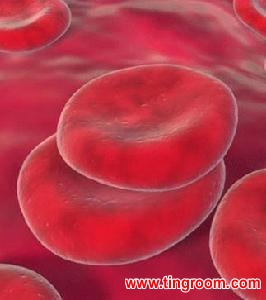-
(单词翻译:双击或拖选)
If blood didn’t circulate through our bodies, carrying oxygen and nutrients1, we wouldn’t be able to live. Blood is so important to life that the body constantly makes new blood.
To do this, the body must produce the liquid part of blood, called plasma2, and the cells that float in it. Plasma is made mostly of water and salts that we absorb through our digestive tracts3 every day. Its job is to deliver nutrients and water throughout the body.
Ninety-nine percent of the blood cells floating in plasma are red blood cells, which carry oxygen from the lungs to the rest of the body and give blood its red color. The average life of a red blood cell is four months.

What Happens After That?
The spleen continuously destroys millions of old red blood cells, recycling the iron to make new red cells. White blood cells, which are part of the immune system, and platelets, which help with blood clotting4 at a site of injury, also float in plasma. They have much shorter life spans than red cells and also are replaced continuously.
If you’ve ever seen a bone cut crosswise, with soft tissue called marrow5 inside, then you’ve seen where blood cells are made. Bone marrow contains special blood cells, which constantly divide to produce new cells to replace the ones that have been destroyed. Why all this bloody6 business in the bone marrow? The body’s process of forming new blood cells helps you recover if you lose blood to an injury, and it also helps blood perform its many functions despite cell damage and loss.
点击 收听单词发音
收听单词发音
 收听单词发音
收听单词发音
1
nutrients

|
|
| n.(食品或化学品)营养物,营养品( nutrient的名词复数 ) | |
参考例句: |
|
|
|
2
plasma

|
|
| n.血浆,细胞质,乳清 | |
参考例句: |
|
|
|
3
tracts

|
|
| 大片土地( tract的名词复数 ); 地带; (体内的)道; (尤指宣扬宗教、伦理或政治的)短文 | |
参考例句: |
|
|
|
4
clotting

|
|
| v.凝固( clot的现在分词 );烧结 | |
参考例句: |
|
|
|
5
marrow

|
|
| n.骨髓;精华;活力 | |
参考例句: |
|
|
|
6
bloody

|
|
| adj.非常的的;流血的;残忍的;adv.很;vt.血染 | |
参考例句: |
|
|
|

















